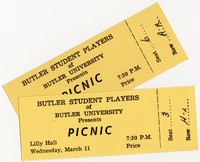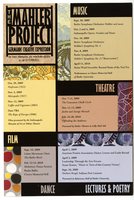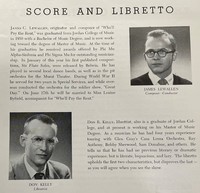Productions
Sample of Productions Through the Decades
A sample of photos and notes from productions through the decades along with a map and timeline are shown below.
For more detailed information on the productions, please see the JCA Department of Theatre Records Collection Guide.
Additional production photographs are available in the University Archives in Irwin Library. Photos from more recent productions (taken by Glen Thoreson, Brent Smith, and Zach Rosing) are available online in Thoreson's Albums on Flickr.
Searchable programs, posters, and photos from many of the productions are being added to the Jordan College of the Arts digital collection.
1900s - 1930s
Dramatic productions were popular in the early 1900s even before the University's Department of Theatre formed. Students from various organizations, including the YWCA, the YMCA, the Biology Club, and several theatre clubs, created their own productions. Plays were also produced to celebrate such special occasions as May Day, Founder's Day, Geneva Stunts, and Commencement.
Before merging with the University, the Jordan College of Music occasionally collaborated with the University on productions, and the University often staged productions at the Odeon, which was part of the JCM campus. Other locations used for University productions prior to the 1940s included the chapel and outdoor spaces on the Irvington campus, outdoor spaces on the current Fairview campus, the Irvington Public School auditorium, Caleb Mills Hall (which was part of the original Shortridge High School in the 900 block of Pennsylvania, now the Minton-Capehart Federal Building), the Masonic Temple, the Little Theatre Playhouse, and the Murat Theatre.
1940s
At least one rehearsal for The Glass Menagerie was held in a St. Vincent's hospital room while cast member Robert Casey recovered from an appendicitis operation. The extra effort was worthwhile because a review in the March 11, 1949, The Indianapolis Times stated that the production was "something you won't want to miss" (p. 24).
Norman Phelps, a Jordan faculty member, composed the background music, which was played on piano, celesta, and flute.
A review of The Hasty Heart by Henry Butler in The Indianapolis Times on Friday, November 12, 1948 said, "Cramped by the Odeon's dollhouse stage and occasionally thrown off balance by over-eagerness and inexperience, these young amateurs nevertheless turn out a far better show than you'll see on the screen or hear on the air. Only a public victimized by the mass-hypnosis of Hollywood and the networks would miss such good, live entertainment" (p. 33).
1950s
The Male Animal, an all-school production directed by Howard L. Grigsby, was presented in multiple locations in 1951. In addition to the theatre-in-the-round production on campus in Atherton, students performed at the Cold Springs Road Veterans Hospital and Camp Atterbury. The Butler Collegian gave a very positive review, especially for actor Laura Jean Ray, who was hit by a car and injured during a thunderstorm on her way to the theatre but still performed in both the afternoon and evening shows. In addition to the 1951 productions, this play was produced again at the Fieldhouse Theatre in 1959.
Two Butler students, James Lewallen (M.M. 1952) and Don Kelly (M.M. 1952), created the musical Who'll Pay the Rent? which received rave reviews. Henry Butler, in his May 19, 1951, article for the Indianapolis Times on page 6, referred to it as a "wonderful musical melodrama" that "had the Odeon rocking with laughter and applause."
James Lewallen's thesis Who'll Pay the Rent: a Music-Melodrama in Three Acts, which includes the script and production notes, is available in print in Butler Libraries' Special Collections.
1960s
Lilly Hall opened in 1962 and Clowes Memorial Hall opened in 1963.
In October 1963, the Drama Department produced its first production at Clowes Memorial Hall, Mother Courage and Her Children. Directed by J. Thomas Adkins, costumes were designed by Marguerite Carlson Adkins, Sidney H. Weedman designed the sets, and James R. Phillippe was the technical supervisor. The production featured professional actress Viola Berwick, and the large cast included local celebrities and University faculty and staff, as well as Daniel Pugh and other theatre students. The play was the Drama Department's first production at Clowes Memorial Hall, and newspaper accounts claim it was the first drama produced in the building and the first time the hydraulic orchestra lift was used to extend the stage over the orchestra pit.
1970s
Festivals '76, a series of three festivals, were held in the spring semester of the 1975-1976 school year to celebrate the United States' Bicentennial. During February 1976, Festivals '76: The Music of Leonard Bernstein with Theater and Dance was held in Clowes Memorial Hall, featuring five days of performances by JCA students. Some of the productions included Mass: a Theatre Piece for Singers, Players, and Dancers and Trouble in Tahiti.
In 1977, student Kathleen Gordon (Class of 1978) started Fantasy Factory. Financed by the Theatre Department, theatre students and other interested students created and presented live educational performances involving acting, poetry, dance, and music to third and fourth grade students from Indianapolis area schools.
In March 1979, Bernard Wurger directed productions of the Pulitzer Prize winning drama The Shadow Box. To prepare, the cast visited with terminally ill patients and their relatives. At the end of each performance, Wurger and doctors from area hospitals led the audience in informal discussions.
1980s
In October of 1981, the Theatre Department presented Getting Out by Marsha Norman, which the 1982 Drift pointed out as having mature subject matter because it dealt with a young woman recently released from prison.
In February 1987, the Departments of Theatre and Music collaborated on a production of Candide in Lilly Hall Studio 160.
During the 1988-1989 school year, the Department of Theatre changed their production schedule from a stock or sequence style to a revolving repertory style, with two shows alternating performance weeks rather than running consecutively. The directors of the season's first shows, James Hatfield, who directed Girl Crazy, and Owen Schaub, who directed Phaedra, felt this new schedule would help participating students keep up with their coursework in other classes and it would give them more time to develop and grow into their characters.
1990s
Faculty member Diane Timmerman adapted and directed five Shakespeare productions for the Butler Essential Shakespeare Series which ran from 1996 through 2000. Each year, the department produced a 90-minute Shakespeare production which was presented in both the Lilly Hall Studio Theatre and Clowes Memorial Hall. Middle and high school students from across Central Indiana attended the student matinee performances at Clowes.
Additionally, Timmerman and the cast led workshops in Shakespeare, stage combat, acting, and auditioning at schools all over Indianapolis before and after the production. Two of the adaptations (Midsummer Night's Dream and Romeo & Juliet) were published by Smith and Kraus, and the covers of the books contain imagery from the Butler productions.
2000s
In April 2000, Butler University Department of Theatre was the overall winner of the national American College Theatre Festival competition in Washington, DC, with Five Plays by Samuel Beckett directed by Butler Department of Theatre Chair John Green.
2010s
In 2014, the department hosted many guest artists, including noted writer and theatre-maker Susan Yankowitz, who attended Butler Theatre’s production of Terminal, directed by faculty member William Fisher. Yankowitz cowrote Terminal with Joseph Chaikin and the Open Theatre. She also did workshops with the students and a post-show discussion with the audience.
2020s
The Department of Theatre began a commitment to producing a musical every other year with the production of Seussical in February 2020. The play was directed by Emily Ristine Holloway with scenic design by Rob Koharchik, costumes by Wendy Meaden, lighting by Michael Moffatt, and sound by Zach Rosing.



